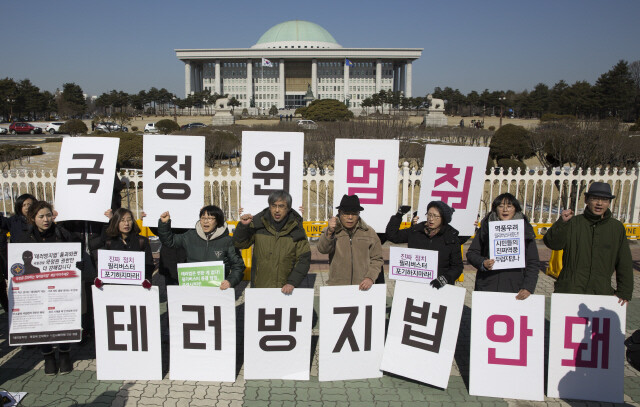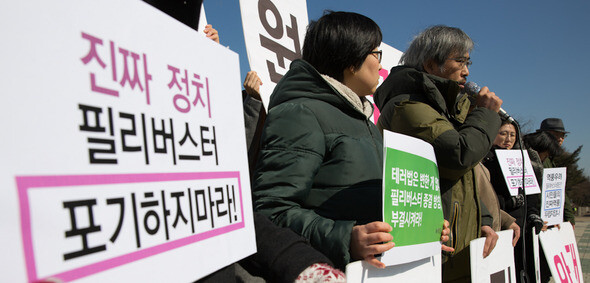hankyoreh
Links to other country sites 다른 나라 사이트 링크
Civic groups say opposition filibuster wasn’t in vain

Civil society unleashed an outpouring of criticism toward the political opposition over the decision by The Minjoo Party of Korea (TMPK) to end a filibuster against a controversial anti-terror bill on Mar. 1 - and toward the ruling Saenuri Party (NFP) for its stubbornness in pushing the legislation through.
Representatives of 46 civic groups opposed to the legislation, including People’s Solidarity for Participatory Democracy (PSPD) and the Korean Progressive Network Center (Jinbonet), voiced their outrage in a press conference that morning in front of the National Assembly in Seoul.
The groups said that citizens have not yet been given the opportunity to adequately discuss the risks the anti-terror bill will bring and that stopping the filibuster now is a violation of the public’s right to know.
Continuing their criticism of the decision to end the filibuster ahead of schedule, the groups said that through the past week’s filibuster, they sensed for the first time that democracy is coming back to life, and noted that they still had until Mar. 10 before the end of the National Assembly session.

The message was that while the opposition may not have a shot at blocking the bill’s legislation while the ruling party holds a majority in parliament, it should not stop its filibuster while citizens continue to show active participation and support and time remains in the Assembly’s regular session.
A “citizens’ filibuster” launched in front of the National Assembly gates on Feb. 23 had resulted in over 160 hours of statements by more than 200 people as of Mar. 1. To date, some 350,000 people have taken part in an emergency signature campaign calling for the legislation to be scrapped.
“The filibuster got many citizens thinking less about how the anti-terror bill related to terrorism or North Korea and more about what impact it would have on their lives,” said Jinbonet activist Chang Yeo-kyung.
“We need answers - not just from the National Assembly but from the administration too - on how the National Intelligence Service handles personal information when it isn’t under the control of courts or the National Assembly. We can’t pass the law before that happens,” Chang added.
Opposition to the filibuster’s end was also voiced online. Seoul National University professor Woo Hee-jong issued blistering criticism on his Twitter account, saying the opposition “doesn‘t seem to think that it’s engaging in politics on behalf of the public. Instead, it’s operating as a sub-organization of the Saenuri majority.”
Konkuk University professor Han Sang-hee posted a Facebook message reading, “I don’t know how much the filibuster is going to hurt [the opposition] in the [April parliamentary] elections, but what’s the big deal in losing over that? Even if they get shellacked, truly showing what democracy is and what human rights mean is what politics is about.”
Seongnam Mayor Lee Jae-myung was less harsh on his Twitter account, writing, “The filibuster is a way for the minority to just draw things out and appeal to the public in an inevitable vote that it’s going to lose. You have to stop it at the right time.”
Another tweet by one internet user suggested the bigger problem was the Saenuri Party‘s steadfast insistence on passing the bill in its original form, despite the risk areas revealed in filibusters in and outside the National Assembly.
“Even if this is it for the filibuster and the anti-terror bill is passed, the ones the people who opposed the legislation should be criticizing are the ruling party and administration that refused to accept the agreement, not the opposition parties that spent more than 150 hours making the public think,” the tweet read.
Many observers stressed that the more than 160-hour-long filibuster was not in vain.
“In any case, the filibuster was meaningful to me in many ways. I learned some things, I discovered lawmakers, and now all I have to do is vote,” tweeted one netizen.
“As a single, low-income woman, I live each day thinking that whenever someone’s human rights are threatened, I could be next,” wrote another. “We shouldn’t forget our reasons for supporting the filibuster and opposing passage of the anti-terror bill.”
By Choi Woo-ri and Park Su-ji, staff reporters
Please direct questions or comments to [english@hani.co.kr]
Editorial・opinion
![[Column] Season 2 of special prosecutor probe may be coming to Korea soon [Column] Season 2 of special prosecutor probe may be coming to Korea soon](https://flexible.img.hani.co.kr/flexible/normal/500/300/imgdb/original/2024/0426/3317141030699447.jpg) [Column] Season 2 of special prosecutor probe may be coming to Korea soon
[Column] Season 2 of special prosecutor probe may be coming to Korea soon![[Column] Park Geun-hye déjà vu in Yoon Suk-yeol [Column] Park Geun-hye déjà vu in Yoon Suk-yeol](https://flexible.img.hani.co.kr/flexible/normal/500/300/imgdb/original/2024/0424/651713945113788.jpg) [Column] Park Geun-hye déjà vu in Yoon Suk-yeol
[Column] Park Geun-hye déjà vu in Yoon Suk-yeol- [Editorial] New weight of N. Korea’s nuclear threats makes dialogue all the more urgent
- [Guest essay] The real reason Korea’s new right wants to dub Rhee a founding father
- [Column] ‘Choson’: Is it time we start referring to N. Korea in its own terms?
- [Editorial] Japan’s rewriting of history with Korea has gone too far
- [Column] The president’s questionable capacity for dialogue
- [Column] Are chaebol firms just pizza pies for families to divvy up as they please?
- [Column] Has Korea, too, crossed the Rubicon on China?
- [Correspondent’s column] In Japan’s alliance with US, echoes of its past alliances with UK
Most viewed articles
- 1[Column] Season 2 of special prosecutor probe may be coming to Korea soon
- 2‘We must say no’: Seoul defense chief on Korean, USFK involvement in hypothetical Taiwan crisis
- 3No good, very bad game for Korea puts it out of Olympics for first time since 1988
- 4Is Japan about to snatch control of Line messenger from Korea’s Naver?
- 5Division commander ordered troops to enter raging flood waters before Marine died, survivor says
- 6Is N. Korea threatening to test nukes in response to possible new US-led sanctions body?
- 7Korea’s 1.3% growth in Q1 signals ‘textbook’ return to growth, says government
- 8N. Korean delegation’s trip to Iran shows how Pyongyang is leveraging ties with Moscow
- 9[Editorial] Korea’s surprise Q1 growth requires objective assessment, not blind fanfare
- 10Amnesty notes ‘erosion’ of freedom of expression in Korea in annual human rights report